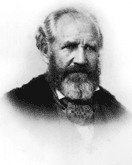Presidential Ambitions
 At the age of 35 Sam Houston, whose 200th birthday was celebrated in Texas and at Sam Houston State University March 2, 1993, was already being mentioned as a possible candidate for the presidency of the United States.
At the age of 35 Sam Houston, whose 200th birthday was celebrated in Texas and at Sam Houston State University March 2, 1993, was already being mentioned as a possible candidate for the presidency of the United States.
He was governor of Tennessee, had a friend in the White House in Andy Jackson, and had only one political liability. He was not married, and as Marquis James describes his reputation in "The Raven," "there had been too much toasting the ladies."
Houston's failed marriage to Eliza Allen took him out of the presidential picture during the early part of his career. But after years of achievement in Texas it was his independent spirit--call it stubbornness or statesmanship--that doomed subsequent chances when the nation needed him most.
By the early 1850s Sam Houston was a U. S. Senator from Texas. His leadership at San Jacinto had opened the west to expansion. He had served as president of the Republic of Texas twice, was happily married, and was proclaiming himself a "teetoteller."
In the spring of 1850 Ashbel Smith wrote to Sam Houston, calling him "decidedly the strongest candidate of the Democratic party," saying even the rival Whigs believed he could be elected.
Houston supported the Compromise of 1850 with the words "a nation divided against itself cannot stand." Eight years later Abraham Lincoln used a similar phrase. "The New York Sun" proposed Houston for president, calling him "a man not influenced by sectional prejudices."
When it came to public relations skills, Houston was a chip off the Old (Hickory) block. Jackson had appointed the first presidential press secretary. Houston gave advance copies of his speeches to the press.
Andrew Johnson, the future Lincoln vice president and successor, said that "all agree that if he could receive the nomination that he could be elected by a greater majority than any other person now spoken of."
The political powers, however, did not select Houston.
In 1854 the Kansas-Nebraska Act was proposed to repeal the Missouri Compromise and allow citizens of the two new territories, Kansas and Nebraska, to decide if slavery was to be allowed. The South favored the bill, which passed.
Houston opposed it, arguing that "Upon the decision which we make..must depend union or disunion." He came back to Texas and said that while his vote was "the most unpopular...I ever gave, it was the wisest and most patriotic." Southern Democrats never forgave him.
Houston turned to the nativist American, or Know-Nothing, party. At first using the memorable line, "Of the Know-Nothings I know nothing," he later supported them openly.
Gregg Cantrell, former professor of history at Sam Houston State University, said that the party dogma fit Houston's republican belief on the threat of corrupting power and his ideas on race--"in the primacy of environment in determining human intelligence and character."
In 1856 the Know-Nothing platform accepted the Kansas-Nebraska Act and Houston was passed over again.
In 1860 his name was placed in nomination by the National Union party by an enthusiastic delegate from New York who said:
"Give us this man, whose blood once ran like water in defense of the union now imperilled; who fought the Indians when they were enemies and lived with them when they were friends; who has been governor of two states; who has drawn his sword in defense of two republics; who has been president of one and is now on his way to that high office in another."
Although Houston did well on the first ballot, he was eventually rejected.
Had Houston become president, the force of his leadership may have somehow spared the United States its bloody civil war, and the United States today might include Mexico. Historian Walter P. Webb wrote in his book on the Texas Rangers that Houston's "grand plan" was to be president and savior of the union and to establish a protectorate over Mexico.
By those measures he was a failure. By almost any other he was not.
Andrew Jackson predicted, and it is written on the monument at Houston's grave in Huntsville: "The World Will Take Care of Houston's Fame."
Text by: Frank Krystyniak
